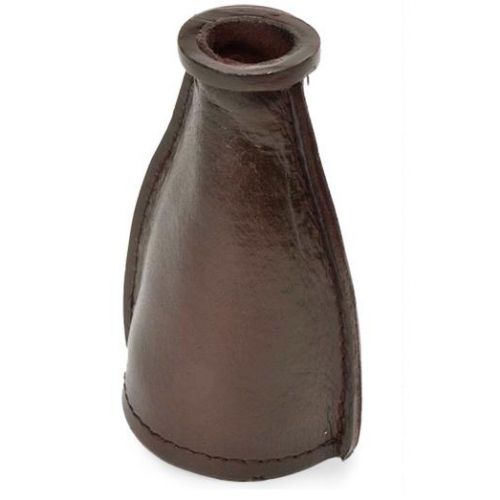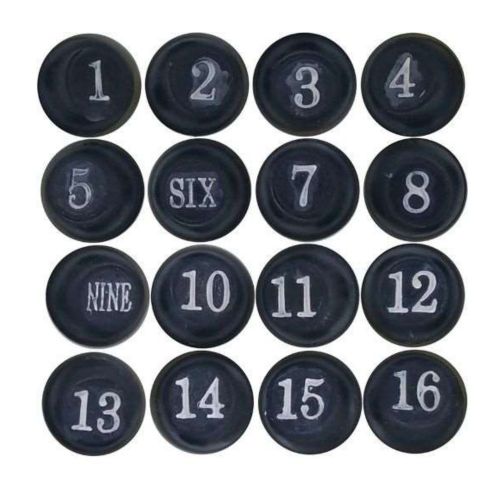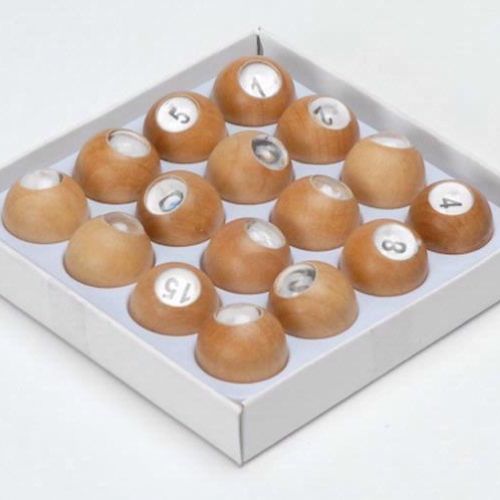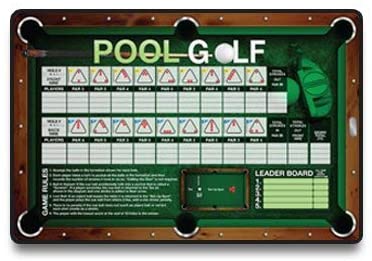Number of players: 2-15
The game is played with a set of 16 balls, 1 cue ball and 15 coloured balls, and numbered 1-15. The table marker throws an alley (a numbered token) to each intending player for his/her rotation in playing. When all names are taken down, the alleys are returned and pool money collected. The marker then throws and alley to each player in the same order as marked in his book. The alleys are then placed in the box according to playing order. (e.g. 1st player in the number 1 spot, 2nd player in number 2 spot etc), and the first player commences play by breaking the balls from the “D”. The cue ball must strike one cushion before coming in contact with pool balls.
The first player to pocket the ball on the table with the number corresponding to his alley wins the pool and the game is over.
A player may pocket any ball on the table other than the cue ball, and continues his/her play until he/she misses pocketing a ball or plays a foul shot. Should he/she pocket a ball other than his/her own, but one of which no player has the alley of that number, he/she gains nothing but continues their stroke. If another player has the alley corresponding to the ball pocketed, then he/she pays the player striking half pool – i.e. 5 cent pool, 2 cent, and so on, but takes his/her own turn when it comes. Any ball once in the pocket by fair shot remains there and does not come back into play during the game. If a ball is pocketed on foul shot, then it is placed on the table on the pink spot, or if that is covered, behind it and as close as possible to it. Immediately after a foul shot has been played, the next player commences play. If another player desires to join the game he/she may do so by paying double or treble pool entrance fee. The new player takes last alley thrown for position.
Foul Shots
- If the cue ball does not strike a numbered ball the shot is replayed but does not count and the next player commences play. Any player’s balls potted on the second shot are spotted on the pink spot.
- If cue ball is potted, the player stops, and the next player commences from the “D” and can play at any ball on the table.
- Should the player pocket the cue ball as well as his/her own ball or any other ball in the same stroke; it is a foul stroke and does not count.
- Any ball pocketed under above shots are re-spotted and next player plays.
- Rules governing foul shots in billiards: e.g. both feet off the floor, moving the cue ball in act of striking, push shots etc, constitute a foul.
- In any case where the marker is satisfied that a player has deliberately played a ball so as to let his following player win the pool, it will be called a foul shot and the ball will be spotted
Golf Pool is a money game played by amateurs. Golf lends a few concepts to golf pool. One point that golf pool shares with golf is the fact it can be played by more than 2 players without the need for teams or other rules changes. In the context of a billiards crowd or a pool hall, the game is simply called golf.
Golf Pool Equipment
Golf pool needs no other equipment than a standard game of eight-ball. Players will need cue sticks, a cue ball, 15 object balls and a billiard table. Golf pool can be played either on a snooker table or an American billiards table.
Golf Pool Rules
In golf pool, each pocket is given its own number designation. These pockets are numbered in a clockwise pattern, from 1 to 6. The first person to pocket their ball in all six pockets wins. The shooters must pocket their ball in ascending fashion, from 1 to 2 to 3 and so on.
To keep track of which player is which, each player chooses one of the numbered balls to act as his personal shooting ball for the game.
Shooting in Golf Pool
A shooter begins his turn in golf pool by placing his object ball on the foot spot.
The shooter then places the cue ball in the “kitchen”, or the area behind the head string on the billiards table. In England or a place with a snooker table, the shooter might be required to place the cue ball in the D area. The D-area is the semicircle found in the kitchen connecting to the head string line.
If a shooter pockets the object ball in the 1-hole, he or she places it on the foot spot again and tries to pot the ball in the 2-hole. This continues until the shooter misses. In this way, it is possible for the first player to win without the others getting a shot.
When the shooter misses, the next shooter takes a turn. This player shoots the ball from the kitchen or D-area. Please note that when a player misses, that player’s object ball remains on the table.
Each player gets to start their first turn by shooting the cue ball from behind the head string. After the first round of turns, though, the cue ball remains on the table wherever it comes to rest. If a player pockets the cue ball, the next player shoots from the kitchen again.
Special Snooker Rule
If a player commits a foul, then the next player to shoot is allowed to remove any balls that snooker or block his object ball. After the shot, the obstructing ball must be replaced.
This rule is one of the few times balls can be moved from the table in billiards games.
When one player legally pockets his object ball in the 6-hole, the game is over and that player wins.
Golf Pool Scoring
Each foul costs a certain point value. A foul point total for each player is kept. This count is usually called a hickey count.
Also, the player who ends the game by pocketing the ball in the 6-hole is also awarded a certain number of hickey points. These point values change from one house game to the next.
Once the game is over, players pay up by figuring out the difference in the various players’ hickey points. The relative difference is how the price is figured, with a set amount of money for each relative hickey point.
Golf Pool Fouls
If you knock any ball off the table, this is a foul in golf pool. Object balls are placed on the foot spot. The cue ball is ball-in-hand behind the head string.
If you pocket the object ball in the wrong numbered hole, this is a foul.
If you fail to hit your object ball first when shooting, this is a foul.
If you don’t contact a rail cushion with the cue ball after it strikes the object ball, or you don’t contact the cushion with the object ball after it was struck by the cue ball or you don’t pot the object ball, this is considered a foul.
Products for pea pool and golf billiards, available to ship within Canada:
-
Sale!

Leather Pea Pool Bottle
$26.99Original price was: $26.99.$21.99Current price is: $21.99. -
Sale!

Plastic Pea Pool Pills
$12.99Original price was: $12.99.$8.49Current price is: $8.49. -
Sale!

Wooden Pea Pool Balls
$14.99Original price was: $14.99.$9.99Current price is: $9.99.






